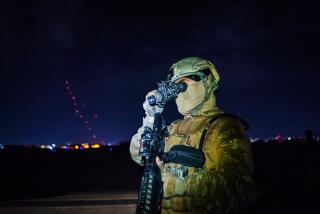U.S. Clarifies Its Policy on Peacekeeping
- Share via
WASHINGTON — The United States will be willing to commit its forces to multinational peacekeeping operations when American interests are not directly threatened, but it generally will act alone when its fundamental economic and political interests are at stake, Administration officials said Thursday.
Furthermore, the United States will set strict limits on the kinds of U.N. operations it will take part in and under whose command. The more dangerous and more complex a mission is, the more insistent the Administration will be that it be led by Americans, officials said.
The outlines of U.S. policy on multinational peacekeeping operations were delivered Thursday by Madeleine Albright, the American ambassador to the United Nations, in a speech at the National War College in Washington. Her remarks reflected the continuing debate within the Administration over conditions governing U.S. participation in multilateral military operations.
Her address was the third in a series of speeches this week by senior Administration officials aimed at clarifying America’s foreign policy goals and its strategy for achieving them.
Secretary of State Warren Christopher and National Security Adviser Anthony Lake earlier laid out the broad principles of Clinton Administration foreign policy.
Albright on Thursday focused on peacekeeping operations as the Administration and Congress wrestle with troubling developments in Somalia, where more than 4,000 U.S. troops are engaged in efforts to relieve starvation and establish a measure of political stability. The Administration is also preparing to send as many as 25,000 troops to enforce a peace settlement in Bosnia-Herzegovina.
In response to growing concern in Congress about the use of U.S. troops in Bosnia, Christopher, Lake and other top national security aides met with senior congressional leaders Thursday to outline the Administration’s peacekeeping policy in general and to discuss the specifics of the role in Bosnia, including the rules of engagement, command structure, duration of the mission and other issues.
Clinton promised two weeks ago that he would not send U.S. troops to Bosnia without consulting with Congress. But he stopped short of saying he would seek formal authorization for the deployment.
The Administration is patching together, amid much internal squabbling, a policy framework to guide decisions on whether and when to participate in such international efforts. Some in the Administration have argued that American participation in U.N.-led forces would relieve some military burden on the United States. But over time, senior policy-makers have become increasingly convinced that under most circumstances, American troops should serve only under U.S. command.
The Pentagon, in particular, is concerned about committing U.S. forces to distant police operations under the command of a nation other than the United States.
Albright said the United Nations has not adequately developed a useful set of criteria governing peacekeeping missions nor built the structures needed to conduct such operations.
“The U.N. emerged from 40 years of Cold War rivalry overweight and out of shape,” Albright said. “Today, U.N. peacekeepers need reformed budget procedures, more dependable sources of military and civilian personnel, better training, better intelligence, better command and control, better equipment and more money.”
She noted that the United Nations has undertaken more peacekeeping operations in the last five years than in the previous 43, that there has been a sevenfold increase in the number of troops involved and a tenfold increase in their cost.
Albright said it is time for the U.N. decision-making process on peacekeeping to be “overhauled.”
“This Administration believes that whether an operation is multilateral or unilateral, whether the troops are U.S. or foreign, young men and women should not be sent in harm’s way without a clear mission, competent commanders, sensible rules of engagement and the means required to get the job done,” she said.
More to Read
Get the L.A. Times Politics newsletter
Deeply reported insights into legislation, politics and policy from Sacramento, Washington and beyond. In your inbox twice per week.
You may occasionally receive promotional content from the Los Angeles Times.










